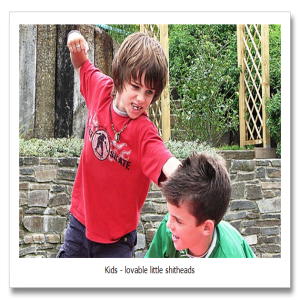
4.8K
Downloads
307
Episodes
Parenting is the most important job we have for which we almost never have any training. This podcast offers glimpses into effective parenting choices and communication
Parenting is the most important job we have for which we almost never have any training. This podcast offers glimpses into effective parenting choices and communication
Episodes

Tuesday Nov 05, 2019
How Do You Lead Your Family?
Tuesday Nov 05, 2019
Tuesday Nov 05, 2019
Whether you are the mom, dad, or other parent figure, you lead your family unit. It comes with the job. How your children follow depends on how you lead. When we think of leadership, most folks are aware of the dominance or submission as leadership styles. The dominant parent declares "my way or the highway," and keeps the family in line with fear and power. The submissive parent says a lot of "yes, dear. what else can I do for you?" A fear of rejection often drives the parent to be submissive to the children. The submissive parent keeps the family in line by giving in, which generates a sense of entitlement in the children, an attitude of "I can do what I want without consequences." Wow!! No thanks. Lesser known is the parental leader of the family who presents as a "benevolent despot." You are in charge. You have earned authority in the family. What you say goes. That's the despot. Your leadership, however, is driven by empathy, compassion, and understanding of needs and feelings. That's the benevolent part. How do you lead your family?

Sunday Nov 03, 2019
Launching Our Teen into Adulthood
Sunday Nov 03, 2019
Sunday Nov 03, 2019
The two most significant moments for us parents in our children's lives are that moment of birth and their launch from adolescence into adulthood. We prepare our children for adulthood through their teen years, letting go little by little. As they learn individually to make good choices, exercise responsibility, and be accountable, they are ready to launch. Just as in our space launches, we parents remain in ground control, while our teen/young adult is in his space craft. He occasionally makes mid-course corrections, as he charts his path to his destiny. These booster rockets come from our consultations with him, just as ground control stays in contact with the spacecraft. We move from advice-based parenting (I remember when I was your age and had similar difficulties) to consultative parenting (I have some thoughts on what you are going through. Do you want to hear them?). Always, we are on the lookout the proverbial emotional fever, to which we respond with active listening. We praise his successes and are allowed bragging rights. Mission accoomplished. Our teen/young adult is launched.

Friday Nov 01, 2019
Problems? How Can You Tell?
Friday Nov 01, 2019
Friday Nov 01, 2019
Isn't it interesting that you just know when your child is having a problem? It's like your "spidey senses" tingle. It's great that you are that tuned into her, but what are you drawing on to figure it out? You child gives off both verbal and nonverbal signals when something is wrong. There's no pattern here, except that what she is saying and doing is typically not like her. In fact, some parents just come right out and ask, "Sweetheart, this isn't like you. What else is going on?" This podcast tells you about BMIRs, that is, Behavioral Manifestation of Internal Response. BMIRs tell the rest of the story and then you get the whole package. Problems will happen. Sometimes our kids are reluctant to share. It's a good thing when your spidey senses are on alert. When you get permission from your child, use your active listening to calm her down and then encourage her proactive problem-solving to help her tackle what's up.

Thursday Oct 31, 2019
Tips for Family Stress Management
Thursday Oct 31, 2019
Thursday Oct 31, 2019
We all have stress, probably all the time. It's either distress or eustress. It's how our body and mind react to bad stuff and good stuff, respectively. As parents, we need to monitor our children's stress levels by being there to help them talk it out through active listening, and also by modelling how we effectively manage our own stress. The first step is to breathe deeply and meaningfully, to give our bodies immediate relief. The next step is to help our child think through ways to avoid such specific stress in the future. Finally, both model and encourage proactive stress management through good eating, sleeping, and physical conditioning habits. In these ways, stress management can lead to teachable moments.

Friday Oct 25, 2019
Should You Fight Your Child's Battles?
Friday Oct 25, 2019
Friday Oct 25, 2019
As parents, our natural instinct is to defend our children, to fight their battles for them, to protect them at all costs. But is this natural instinct the most helpful for your child. The answer is, not necessarily so. Your response to your child's problems depends on the kind of battle and the age/stage of your child. However, as with any situation where you see his emotional fever spike, start with active listening, to bring the fever down. Then ask permission to give your thoughts about his conflict. Where some response from him is indicated, collaborate with him about what shape that response will take. Your overall message to him is, I love you. I'm so sorry you are going through a hard time. I have confidence in your being able to make sense of all of this and to work it out. I've got your back. Therein lies a teachable moment

Friday Sep 27, 2019
Correction with Time-Out
Friday Sep 27, 2019
Friday Sep 27, 2019
You know, stuff happens. As the parent, you want to handle that stuff in the best, most effective way. Frequently, parents use time-out to handle stuff. However, how you use time-out is more important than that you use it. Some parents simply put their child in time-out "until I say so." This is unhelpful. It makes the parent feel good, feel powerful, but most children simply wait out their parent and don't learn what to do to avoid punishment in the future. Effective use of time-out is simply to give your child time and space to calm down. When they are calm, then they can hear you better. It also gives you time to think through how you want your child to benefit from the time out. If you see your child's time-out as his punishment, he reaps no benefit from it. It simply becomes a power game. When you sit and talk with your child after he has calmed down, using your active listening and defining accountability and responsibility, your relationship is enhanced and you both reap benefit, a magical moment.

Tuesday Sep 24, 2019
Parenting is Lifelong
Tuesday Sep 24, 2019
Tuesday Sep 24, 2019
Do you ever stop parenting your child? Nope. You signed on for the long haul. In Proverbs 22:6, Solomon cautioned us parents to "raise your children in the ways of the Lord so that, when they grow old, He will not depart from them." That's pretty daunting. What you say to your children, how you act, how you parent, will be with them for all of their lives, whether you are there in person or not. Just as there are stages of child development, so too are there stages of parenting. When your teen reaches adulthood, you shift your parenting from advice-based to consultative. He's grown and make his own choices, but you are available to impart your wisdom, if he asks. Be available. Beyond time and distance, your parenting is lifelong, and with your availability comes potential teachable moments.

Friday Sep 20, 2019
Down Time, What A Blessing!
Friday Sep 20, 2019
Friday Sep 20, 2019
It's true. Indispensability is a curse!! If you have to be the one to do the job and get it done right, then you are failing as a parent :( Doing it yourself may be a short relief and save you time and steps, but it is a longer term problem. How will your kids learn sharing, helping, and personal responsibility if you are doing it all for them? If you are indispensable, then you are doing too much. Also, you can't be your best self if you are always doing for others. Jesus called us to love one another as we love ourselves. That is, take care of your own needs and feelings before tending to others. It's like the direction that airline attendants give passengers before takeoff. In case of a problem and the air masks drop down in front of you, put your air supply on yourself first, so that you can better help others around you. Build self-care into your time management and include it in family planning and calendar events. Don't give up on yourself, caring for your family at your expense. Down time is a blessing to all of you.

Wednesday Sep 18, 2019
Emotional Fever? Active Listen
Wednesday Sep 18, 2019
Wednesday Sep 18, 2019
Why is active listening such a big deal? It is the go-to response when you see your child in any kind of stress, difficulty, or emotional pain, what I call an emotional fever. Active listening calms her down and is the balm for her distress. When you are active listening your child, you are conveying your efforts to say back to her what you think she is feeling. You are not judging, not criticizing, and certainly not solving her problems for her. You are conveying to her that you are with her and that you have confidence in her handling her situation well. You get what she's going through and you've got her back. When you see her emotional fever subsiding, only then can you ask permission to share your wisdom with her. This conveys your respect and confidence in her. Active listening is your most valuable communication tool when parenting your children through their inevitable tough times. Active listening is a big deal.

Monday Sep 16, 2019
Being Alone in Your Family
Monday Sep 16, 2019
Monday Sep 16, 2019
Being alone is a funny thing. Sometimes it's good, renewing, and delightful. Other times it's alienating, foreboding, and unwanted. As parents, we want to understand and allow for all of the moods that our children may experience. He's been in his room by himself a long time now. Does he just want to be alone? Is he lonely? Is something going on? Rather than guess or hope he is okay, check it out. Seek him out and assess his mood in conversation. If he shows signs of an emotional fever, use your active listening to help him calm down. Encourage his participation in family time. Respect his privacy, while also reminding him that he is a part of family. His mood could be a symptom of other issues, such as anxiety, depression, or stress. Use joint problem-solving to help him find tools to address his concerns/issues. This is great parenting that generates teachable moments.
